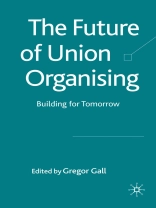While ‘union organising’ has developed over time and in many different environments, it has become apparent that a number of key problems have developed. Evaluating its efficacy in terms of union strategies, tactics, styles and resources, this title outlines a number of strategies for improving these deficiences.
Jadual kandungan
Union Organising’ – Past, Present and Future; G.Gall Union Organising in the US: New Tactics, Old Barriers; K.Moody Opening Pandora’s Box: The Paradox of Institutionalised Organising; S.Cohen Social Partnership and Union Revitalisation: The Irish Case; K.Allen Union Organising in the Netherlands: A Combination of Organising and Servicing Strategies; M.van Klaveren & W.Sprenger Reinvention of Activism: A Chance for Union Renewal in New Market Economies? The Case of Poland; A.Mrozowicki , V.Pulignano & G.van Hootegem The ‘Servicing Organising Community Continuum’: Where are Australian Unions Today?; M.Jerrard , S.Cockfield & D.Buttigieg Labour Union Strategies in the European Union Steel Sector; D.Stroud & P.Fairbrother Clean Start: Fighting for a Fair Deal for Cleaners; M.Crosby Organising Immigrants: State Policy and Union Organising Tactics in the Republic of Ireland; M.Gonzalez-Perez , T.Dundon & T.Mc Donough Union Organising with ‘Old’ and ‘New’ Industrial Relations Actors: Sex Workers in Australia and the United States; G.Gall Reconstructing Construction Unionism: Beyond Top-down and Bottom-up; D.Belman & A.Smith Contrasts and Contradictions in Union Organising: The Irish Mushroom Industry; F.Arqueros-Fernández Union Renewal and Young People: Some Positive Indications from British Supermarkets; I.Byford
Mengenai Pengarang
GREGOR GALL is Research Professor of Industrial Relations and Director of the Centre for Research in Employment Studies at the University of Hertfordshire, UK. His previous work includes two edited volumes on union organising and books on postal workers, the labour movement in Scotland, sex workers, and finance workers. He writes regular columns for
the Morning Star,
Solidarity and
The Guardian’s ‘comment is free’.












